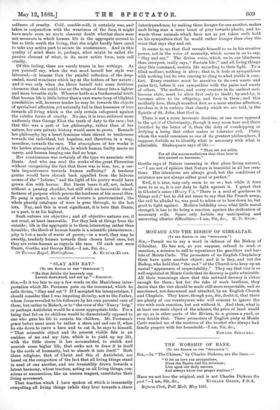" SLAY AND EAT."
[To THE EDITOR OF THE" SPECTATOR."]
"He that drinks the heavenly cup Loveth downward, and not up."—EMERSON.
Sia,—Is it too late to say a few words on the Manichean inter- pretation which Mr. Footman puts on the command, which he calls divine, "Slay and eat"? If I accepted his interpretation, I should consider that I was imputing divinity, not to the Father, whom Jesus revealed to his followers by his own parental care of them, but rather to Moloch, or to "the crew of the 'Nancy' brig," or perhaps Antichrist would be a more appropriate title. For a being that fed on its children would be diametrically opposed to one who gave his life to sustain his children. Mr. Footman's grace before meat must be rather a stern and sad one if, when he sits down to carve a hare and to eat it, he says to himself, "That miserable object and its present visible fate is an -emblem of me and my fate, which is to yield up my life, with the little stores it has accumulated, to enrich and nourish some higher life, that seeks not to draw it to itself by the cords of humanity, but to absorb it into itself." Both -these religions, that of Christ and this of Antichrist, are based on the recognition of the fact that all living things stand in need of one another, and are irresistibly drawn towards a latent harmony, whose traction, acting on all living things, con- scious or unconscious, like an unseen magnet, constitutes their living movement.
That traction which I have spoken of, which is incessantly compelling all living things (while they live) towards a closer
interdependence, by making them hunger for one another, makes each living man a mere beast of prey towards plants, and to- wards these animals which have not as yet taken such hold on his sympathies that he would rather hunger than obey the voice that says slay and eat.
It seems to me that God reveals himself to us in his creative power, not in the voice of necessity, which seems to us to say, "Slay and eat." The divine voice, which we in our blindness thus interpret, really says," Sustain life ;" and all living things obey this command, sustain life according to their light. To a blind mollusc, nothing is alive ; that is, it feels or sympathises with nothing but its own craving to cling to what yields it com- fort. Every creature must be sensitive to its own wants and pains first, before it can sympathise with the pains and wants of others. The mollusc, and every creature in its earliest mol- luscous state, must be alive first only to itself; by-and-by, it becomes alive to its offspring, and lives in them ; and this motherly love, though manifest first as a mere uterine affection, involves in it in embryo that charity which we are told, in the Epistle of St. John, that God is.
There is not a more insensate doctrine, or one more opposed to the spirit of Christianity, though it may seem here and there justified by the letter of it, than the duty of Tr orshipping or deifying a being that either makes or tolerates evil. Plato, whom the world canonises as one of its greatest philosophers, I suppose, forbids us to identify what is necessary with what is admirable. Shakespeare says of life :— "Thou art not noble,
For all the accommodations that thou basest Are nursed on baseness."
Goethe says of Nature (meaning in that place living nature), —"I am not of opinion that Nature is beautiful in all her crea- tions. Her intentions are always good, but the conditions of existence are not always either good or perfect."
Evil, it is true, may only seem to Us SO ; but while it does seem to us so, it is our duty to fight against it. I grant that in Gloster's sense (Henry V.), "There is a soul of goodness in things evil ;" but he did not mean to say that the French army, the evil he alluded to, was good to adore or to bow down to, but good to fight against. Modern infidelity owes what little moral strength it has to its being a reaction against the deification of necessary evils. Space only forbids my anticipating and answering ulterior difficulties.—I am, Sir, &c., G. D. SNOW.


































 Previous page
Previous page